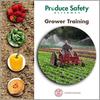
Added by Rachel Schattman • Last updated June 6, 2025
Author: Iowa State University Extension and Outreach
Type: Fact Sheets
Topic: Worker Health, Hygiene & Training; Post Harvest Handling & Sanitation
Cleaning and sanitizing are part of an overall food safety plan to provide the safest and best quality fresh fruits, vegetables, greens, and herbs to customers. Checklists, standard procedures, and schedules are typically the best ways to communicate
information to employees and document that proper cleaning and sanitizing practices are followed. This fact sheet includes suggested...

Added by Hans Estrin • Last updated July 3, 2024
Author: Produce Safety Alliance
Type: Produce Safety Rule – FSMA compliance; Planning & Verification Programs – CAPS & GAPS; People & Services
Topic: Produce Safety Introduction; Worker Health, Hygiene & Training; Soil Amendments (Compost & Manure); Wild/Domestic Animals & Land Use; Agricultural Water (Pre/Post Harvest); Post Harvest Handling & Sanitation; Produce Safety Rules, Regulations & Templates; Diversified Farms: Processing, Aggregation, Livestock Integration
This is the Produce Safety Alliance Grower Training Manual, which is available for public use. The date after the tab name indicates the upload date. As revisions are made the dates will be updated to reflect a revised upload.

Added by Rachel Schattman • Last updated April 24, 2024
Author: Lisa Kitinoja and Adel A. Kader
Type: Fact Sheets
Topic: Post Harvest Handling & Sanitation
This manual covers harvest and preparation for market, curing root/tuber/bulb crops, packing house operations, packing and packaging materials, decay and insect control, temperature and relative humidity control, and more. The introduction to the manual starts: "The three main objectives of applying postharvest technology to harvested fruits and vegetables are: to maintain quality (...

Added by Hans Estrin • Last updated October 24, 2022
Author: Hans Estrin
Type: Planning & Verification Programs – CAPS & GAPS
Topic: Produce Safety Introduction; Worker Health, Hygiene & Training; Soil Amendments (Compost & Manure); Wild/Domestic Animals & Land Use; Agricultural Water (Pre/Post Harvest); Post Harvest Handling & Sanitation; Produce Safety Rules, Regulations & Templates; Diversified Farms: Processing, Aggregation, Livestock Integration
Community Accreditation for Produce Safety (CAPS) is a program of the Vermont Vegetable and Berry Growers Association (VVBGA). CAPS is a voluntary, practical approach to documenting the use of practices that reduce food safety risks on farms that grow fresh produce. The CAPS advisory board of farmers and service providers has identified 18 practices that are required for accreditation. CAPS uses...

Added by Andrew Chamberlin • Last updated March 21, 2021
Author: Chris Callahan & Andy Chamberlin
Type: Case Studies & Examples; Fact Sheets; Photos & Videos; Tools, Calculators & Project Templates
Topic: Produce Safety Introduction; Worker Health, Hygiene & Training
Handwashing has been shown to be one of the most effective ways to reduce the risk of transmission of human pathogens between people. But, sometimes we are inconveniently far from the closest wash room and sink. Hand washing stations provide a portable means of washing hands on farms, at farmers’ markets, and at recreational sites. This guide was motivated by a desire to improve current...

Added by Hans Estrin • Last updated November 23, 2020
Type: Photos & Videos
Topic: Worker Health, Hygiene & Training
It can be easy to get portable hand washing in the field. Check out this design from NH Ext.

Added by Chris Callahan • Last updated November 23, 2020
Type: Photos & Videos
Topic: Worker Health, Hygiene & Training
The Brattleboro Winter Farmers Market built these two handwashing stations to allow their customers access to handwashing facilities during the winter market. This is a variation of the handwashing station design available at the UVM Extension Agricultural Engineering page (http://go.uvm.edu/handwashingstation). The unique feature of this build is the use of insulated clean water supply...
Added by Hans Estrin • Last updated September 8, 2020
Type: Case Studies & Examples; Photos & Videos; Tools, Calculators & Project Templates; Produce Safety Rule – FSMA compliance
Topic: Worker Health, Hygiene & Training; Post Harvest Handling & Sanitation
We built and installed two hands-free hand wash "shelves" to mount on our harvest wagons (or any harvest vehicle).

Added by Hans Estrin • Last updated April 15, 2019
Author: Hans Estrin
Type: Case Studies & Examples; Photos & Videos
Topic: Worker Health, Hygiene & Training
It takes about 20 seconds to wash and rinse your all hand surfaces. Thus at $12/hr, farmers will pay their employees about 10 cents each time they wash their hands ! This 2.5 minute video, showing the 10-cent hand wash, can be use to train farm employees.

Added by Rachel Schattman • Last updated February 5, 2019
Author: Lynn Blevins, Ginger Nickerson, and Hans Estrin
Type: Fact Sheets
Topic: Produce Safety Introduction; Worker Health, Hygiene & Training; Soil Amendments (Compost & Manure); Wild/Domestic Animals & Land Use; Post Harvest Handling & Sanitation; Produce Safety Rules, Regulations & Templates
Practical Produce Safety (PPS) is a cost-effective strategy for growers to implement food safety practices that minimize risk while maximizing produce quality and farm profitability. UVM Extension’s Practical Produce Safety Curriculum and these materials were designed specifically for small produce farms that primarily direct market their produce through CSA’s, farm stands, farmers markets, or...
Added by Rachel Schattman • Last updated February 4, 2019
Author: Luke Laborde, Ph.D.
Type: Fact Sheets; Planning & Verification Programs – CAPS & GAPS
Topic: Produce Safety Rules, Regulations & Templates
This collection of articles covers information and resources needed to meet Good Agricultural Practices (GAPs) and Food Safety Modernization Act (FSMA) standards specific for the mushroom industry.









